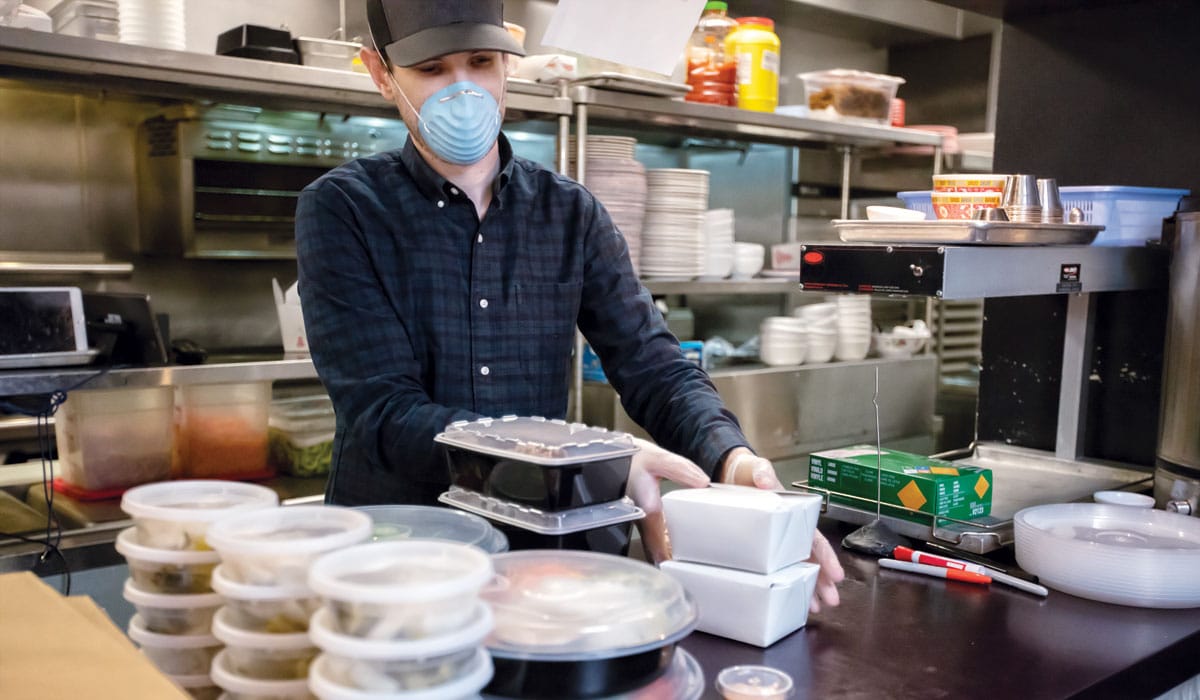Jim Gregory, founder and CEO of OnCampus Brands, has a saying about nontraditional franchising, and he thinks it’s apt for the situation brands face as they navigate operating storefronts in airports, stadiums, and college campuses post-pandemic.
“There’s a reason they call our field of work nontraditional,” Gregory says. “We’ve always had to be good at adapting to space and constraints, and embracing upside opportunity.”
As challenging as COVID-19 has been on the industry as a whole, it’s been particularly brutal to units that occupy those nontraditional venues. Consider that virtually every college campus had, to varying degrees, been shut down for about six months by the time fall semester rolled around; that, according to the Transportation Security Adminstration, airport traffic has only been about 20 percent of pre-COVID-19 numbers; and that no major American sport has had fans in attendance since mid-March, and the future of those fans coming back is precarious at best.
To put it mildly, it’s been a nightmare for nontraditional franchises, which is why it might be surprising to note that Gregory, and many like him, seem so calm in this moment.
“The brands that are experienced with nontraditional franchising are simply going to be better at moments like these,” he says. “The brands that aren’t are really going to struggle, and I think that we’ve seen that.”
In other words, while those units in nontraditional spaces are getting hammered right now, the lessons gained from the ever-evolving world of nontraditional franchising have served brands well as they try to adapt to pandemic life, even in their streetside units.
For example, Gregory believes ghost kitchens might be something of the norm on college campuses in the future, and he says he’s already seeing many brands experiment with shelving out in front of storefronts that can facilitate an experience where a student could order from their phone and quite literally grab their sandwich on the run, if necessary. That methodology doesn’t just reduce face-to-face interaction; it eliminates it completely. All of this is a lesson that can be applied to both campus life and streetside service.
“We can’t forget that while all of us—the administrations, students, faculty, and on-campus brands—want the schools to be open, we also want safety to be the first priority,” Gregory says. “That means our flexibility has to remain, and brands are going to have to find ways to potentially deliver a top-notch brand experience in a way they’ve never tried before, on campus and off.”
Firehouse Subs has experimented with similar systems, including leaving food in a lockbox to be accessed with a code that gets sent to the student’s phone at the time the order is placed. The company wants to get this right not just because it will keep students safe and comply with campus regulations, but also because nontraditional franchising, and foodservice in general, has been moving in this direction for a long time now. COVID-19 was just the accelerant that turned a flame into a wildfire.
“We are all about being part of communities and showing them that we are committed to them during good times and bad,” says Greg Delks, vice president of franchising at Firehouse Subs. “One of the reasons we believe there is an opportunity right now is we’re seeing what we saw during the financial crisis, where there was a ton of really good mid-management people let go by their brands. We find that they are perfect franchisees, and we find a way to get them financed and it really goes with our philosophy that franchising is about finding the right person and the right location. If you get those things right, and you really invest in the community that you want to be a part of, the rest will follow.”
Oath Pizza is another brand that bet big on the nontraditional space. The company partnered with Aramark to get into college campuses, corporate dining facilities, and hospitals in several states, including Michigan, North Carolina, and Pennsylvania.
Oath CEO Drew Kellogg says the foundation of the brand’s interest in nontraditional franchising has always been about more than the bottom line. “Aramark is an amazing partner in giving us access to consumers we wouldn’t otherwise have access to,” Kellogg says. “The amount of reach we have been able to deploy not only on the consumer side but also on the supply chain side, the brand recognition is tremendous. And while this pandemic has been really challenging, we know it’s not going to be permanent.”
He adds that when students do come back, they’ll need to eat. “For us it becomes, ‘How do we pivot and support them and be available when they do come back to campus?’”
Delks and his team are similarly bullish on the nontraditional space.
“Airports are going to come back, domestic travel especially, and we want to be in any airport that loses a vendor during this time,” Delks says. “They might come back within a year, two years, it really doesn’t matter to us, because we want to be there. And while college-campus living will be changed forever, we see an additional opportunity on those campuses for retail brands like Firehouse Subs, whether it’s this year, next year, or some time in the future. We’ll be there and we’ll have already proven to our campus partners that they can count on us.”
As a testament to that point, the ink is barely dry on an agreement Firehouse Subs signed to take over a space at Purdue University in 2022. “We’re planting seeds today that we’ll harvest another day,” Delks says. “In the airport space, it’s great advertising for the brand. But on a college campus? You’re setting up a loyal fan of the brand for life.”





